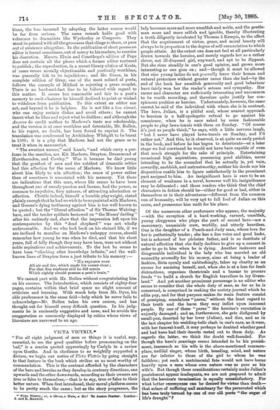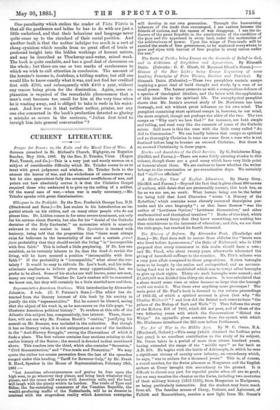VICTA VICTRIX.*
"Fait all right judgment of men or things it is useful, nay, essential, to see the good qualities before pronouncing on the bad," is a maxim quoted approvingly by Carlyle in a review upon Goethe. And in obedience to so weightily supported a dictum, we begin our notice of Pieta Vietrix by going straight to that feature in the book which strikes us as most worthy of commendation. This is the contrast afforded by the characters of the hero and heroine as they develop in contrary directions, one upwards and the other downwards, according as their owners are true or false to themselves,—that is to say, true or false to their better nature. When first introduced, their moral platform seems to be pretty much the same ; but as the story progresses, the lady becomes more and more unselfish and noble, and the gentleman more and more selfish and ignoble, thereby illustrating a truth diligently inculcated by Thomas a Kempis, to the effect that the acquirement of virtue, grace, and moral beauty will always be in proportion to the degree of self-renunciation to which people attain. At the outset one does not feel at all particularly drawn towards the heroine, and merely regards her as a rather clever, not ill-disposed girl, wayward, and apt to be flippant. But she rises steadily in one's good opinion, and grows more interesting as one goes on ; and—though it must be allowed that nice young ladies do not generally leave their homes and natural protectors without greater cause than she had—by the end of the book her unselfish generosity and good behaviour have fairly won her the reader's esteem and sympathy. Her career and character are sufficiently interesting and uncommon to be worth recording, and therefore quite justify her conspicuous position as heroine. Unfortunately, however, the same cannot be said of the individual with whom she is in contrast. The hero, Julian, is a pitiful soul, whose nearest approach to heroism is a half-apologetic refusal to go against his conscience, when he is once asked by some fashionable people to play lawn-tennis with them on Sunday. " Of course it's just as people think," he says, with a little nervous laugh, " but I never have played lawn-tennis on Sunday, and I'd rather not." And this, be it observed, is at quite an early period in the book, and before he has begun to deteriorate—at a later stage we feel convinced be would not have been capable of even that much struggle for the sake of principle. Entertaining occasional high aspirations, possessing good abilities, never intending to be the scoundrel that he actually is, yet vain, cowardly, snobbish, and untrustworthy, neither his deeds nor his disposition enable him to figure satisfactorily in the prominent part assigned to him. An insignificant hero is sere to be an element of weakness in a novel, however well his insignificance may be delineated ; and those readers who think that the chief characters in fiction should be—either for good or bad, either in themselves or in their adventures—different from the common run of humanity, will be very apt to fall foul of Julian on this score, and pronounce him unfit for his place.
Of the numerous other performers who appear, the majority —with the exception of a hard-working, earnest, unselfish, young clergyman who plays the part of second hero—are a mercenary, unamiable crew, worldly, and utterly heartless. One is the daughter of a Punch-and-Judy man, whose love for her is pathetically tender; she has a fine voice and good looks, but is ashamed of her plebeian father, and is so destitute of natural affection that she flatly declines to give up a concert in order to go to him when he is dying. Another insincere and disagreeable individual is the lady who has married an old nonentity avowedly for his money, aims at being a leader of fashion, flirts openly and unblushingly, takes up charity as an excuse for amusing herself, and, when she is at a loss for fresh distractions, organises theatricals and a bazaar to procure funds " to build a church for English travellers in icy Greenland." And yet another prominent personage is an editor who seems to consider that the whole duty of man, as far as he is concerned, is comprised in making the society-journal which he edits pay, and for that purpose makes its main feature consist of gossiping, scandalous " pares," without the least regard to their truth and the harm they may inflict upon innocent people. By one of them "paras " the heroine's reputation is unjustly damaged:; and as, furthermore, she gets disfigured by small-pox, deserted by her lover (Julian), and dies, and as in the last chapter his wedding-bells clash in one's ears, as it were, with her funeral-knell, it may perhaps be doubted whether good and bad have had their deserts meted out to them duly. As regards the latter, we think the doubt well-founded. For though the hero's ,marriage seems intended to be his punishment, inasmuch as his wife is the above-mentioned commonplace, nnfilial singer, whose birth, breeding, mind, and nature are far inferior to those of the girl to whom he was faithless; yet such a matrimonial fate would not have borne heavily upon a man whose own nature was as poor as his wife's. But though these considerations certainly make Julian's punishment appear inadequate, we are not prepared to admit that the heroine's termination is equally unsatisfactory. For what better recompense can be desired for virtue than death— that solace of suffering and sanctuary for the persecuted which has been truly-termed by one of ant ad poets " the sugar of life's draught" P One peculiarity which strikes the reader of Vida Victriz is that all the gentlemen and ladies he has to do with are just a little underbred, and that their behaviour and language never quite come up to the standard of their social position. And another fault is that the author indulges too much in a sort of cheap cynicism which results from no great effort of brain or profound insight into the hidden workings of human nature, and may be described as Thackeray-and-water, mixed weak. The book is quite readable, and has a good deal of cleverness on the whole ; but there are one or two marks of carelessness to which we wish to call attention in conclusion. The amount of the heroine's income is, doubtless, a trifling matter, but still one would like to know exactly what it was, and.not find her credited first with £700, and subsequently with £400 a year, without any reason being given for the diminution. Again, some explanation is required of the remarkable phenomenon that a man's coat becomes too small for him at the very time when he is wasting away, and is obliged to take in reefs in his waistcoat. And how was it that neither author, printer, nor any one else concerned in the book's production detected so glaring a mistake as occurs in the sentence, "Julian first tried to inveigh him into general conversation "















































 Previous page
Previous page